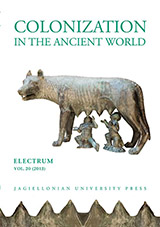Herulian Settlements in Byzantium under Emperors Anastasius and Justinian
Herulian Settlements in Byzantium under Emperors Anastasius and Justinian
Author(s): Stanisław TurlejSubject(s): History
Published by: Wydawnictwo Uniwersytetu Jagiellońskiego
Summary/Abstract: The aim of this article is to draw attention to the need to intensify historical research on Herulian settlements in Byzantium under Emperors Anastasius and Justinian based on the analysis of written sources. The starting point for studying the history of the Heruli in Late Antiquity should be a historical analysis of the excursus devoted to them by Procopius of Caesarea in the book VI Wars. As a result of a historical analysis based on literal interpretation and critical examination, taking into account legal circumstances and the historical context, it can greatly contribute to our knowledge of Herulian history. To sum up the results of the conducted research, it is possible to give quite a precise description of the relations between the empire and the Heruli based on an analysis of the accounts of Procopius of Caesarea and Marcellinus Comes. In 512, Emperor Anastasius settled the tribe on the empire’s lands. Taking advantage of their diffi cult situation, he probably forced them into full subordination. It seems that the Heruli, deprived of their tribal organisation and striving to keep their independence, rebelled and attacked the Romans at the fi rst opportunity, i.e. ca. 514. The imperial army managed to defeat them as early as 515 or 516, and Anastasius refused to give them the status of allies, i.e. improve their position. In this situation it seems most likely that the empire completely broke its ties with the Heruli and the tribe left the empire’s lands. At this stage of the analysis it is diffi cult to determine to what extent Procopius was aware of the nuances of Anastasius’ policy, as his account of the Herulian migration in search of new lands is very brief and schematic. All the details he provides, apart from the information about the Heruli crossing the Danube River on their own initiative, are in complete agreement with the reconstruction of events based on Marcellinus Comes’ mention. Only after completing the analysis of Procopius’ whole account on the Heruli will it be possible to formulate conclusions about its reliability and the sources he used.
Journal: Electrum. Studia z historii starożytnej
- Issue Year: 2013
- Issue No: 20
- Page Range: 163–176
- Page Count: 14
- Language: English

